Accused of Blocking Efforts to Hire, Retain Blacks
Black Journalist Promoted to No. 2 at Teen Vogue
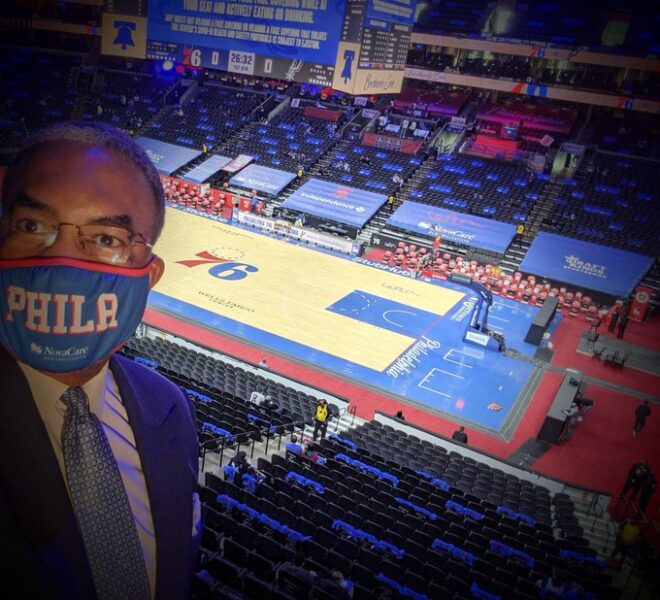
Accused of Blocking Efforts to Hire, Retain Blacks
“CBS has ousted two powerful TV station executives following allegations of racist and abusive behavior,” Meg James reported Wednesday for the Los Angeles Times.
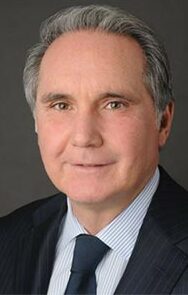 “Peter Dunn (pictured), who served as president of the TV Stations group since 2009, and David Friend, the senior vice president of news for more than a decade, are no longer part of CBS, the company’s chief executive, George Cheeks (pictured, below), said Wednesday in an email to staff.
“Peter Dunn (pictured), who served as president of the TV Stations group since 2009, and David Friend, the senior vice president of news for more than a decade, are no longer part of CBS, the company’s chief executive, George Cheeks (pictured, below), said Wednesday in an email to staff.
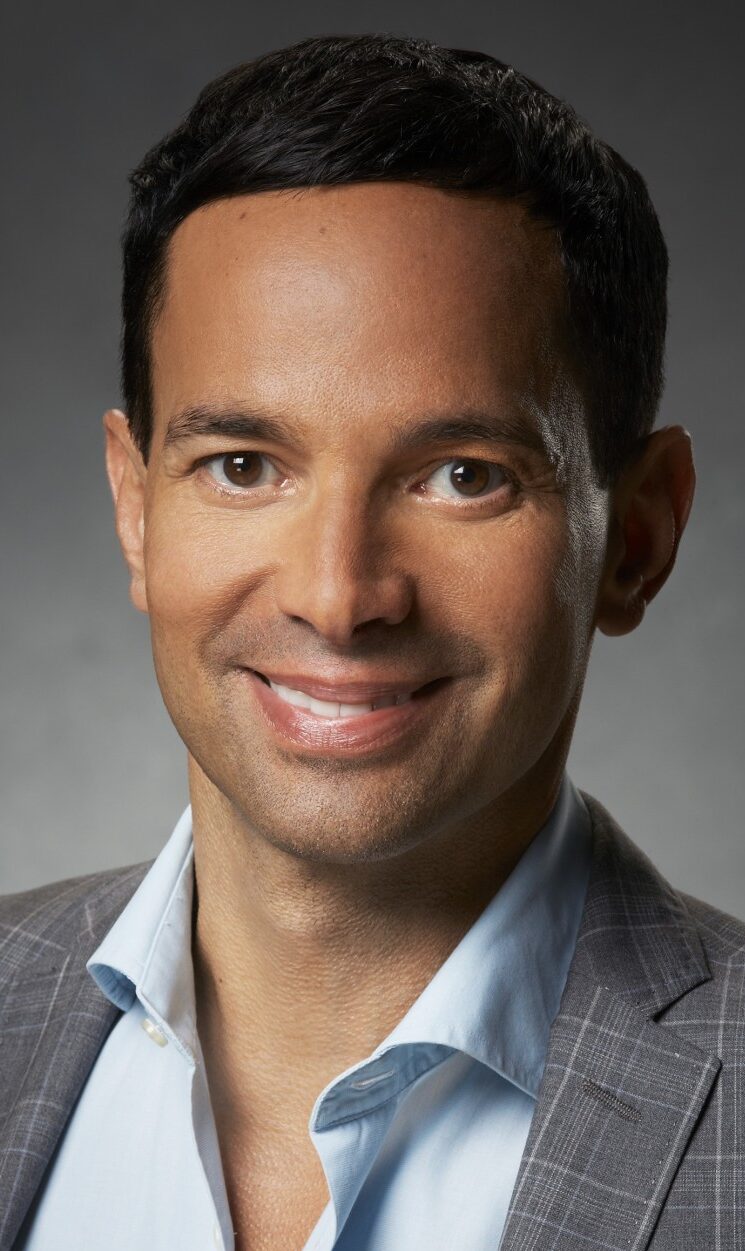 “The move comes two months after an investigation by the Los Angeles Times alleged that the pair cultivated an environment that included bullying female managers and blocking efforts to hire and retain Black journalists.”
“The move comes two months after an investigation by the Los Angeles Times alleged that the pair cultivated an environment that included bullying female managers and blocking efforts to hire and retain Black journalists.”
In January, the National Association of Black Journalists called for the two men’s resignations. CBS placed the two on administrative leave pending the outcome of a third-party investigation.
James, who broke the original story, continued, “Dunn allegedly made racist comments about Ukee Washington, a beloved Black anchor at the CBS-owned television station in Philadelphia. In addition, staff members in Philadelphia and at the flagship station WCBS-TV in New York complained of inappropriate behavior and news coverage decisions that neglected communities of color. The men have previously denied any inappropriate conduct.
“CBS suspended the two executives a day after The Times’ report was published.
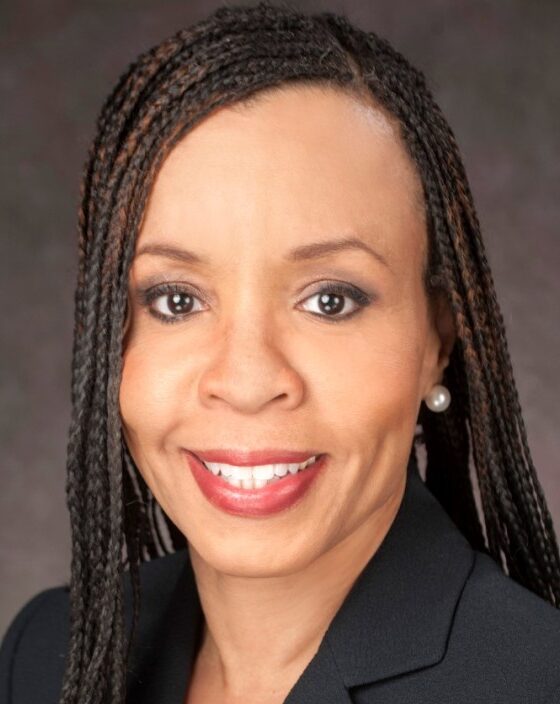 “ ‘We have determined that CBS Stations President Peter Dunn and SVP of News David Friend are not returning to their positions and will be leaving the Company,’ Cheeks said in the email. ‘Until we have new leadership in place, Bryon Rubin will continue to run the Stations group while Kim Godwin (pictured) will continue her oversight of Stations’ news operations. I will be sure to update you with information about permanent leadership for the group as soon as it is finalized.’ ”
“ ‘We have determined that CBS Stations President Peter Dunn and SVP of News David Friend are not returning to their positions and will be leaving the Company,’ Cheeks said in the email. ‘Until we have new leadership in place, Bryon Rubin will continue to run the Stations group while Kim Godwin (pictured) will continue her oversight of Stations’ news operations. I will be sure to update you with information about permanent leadership for the group as soon as it is finalized.’ ”
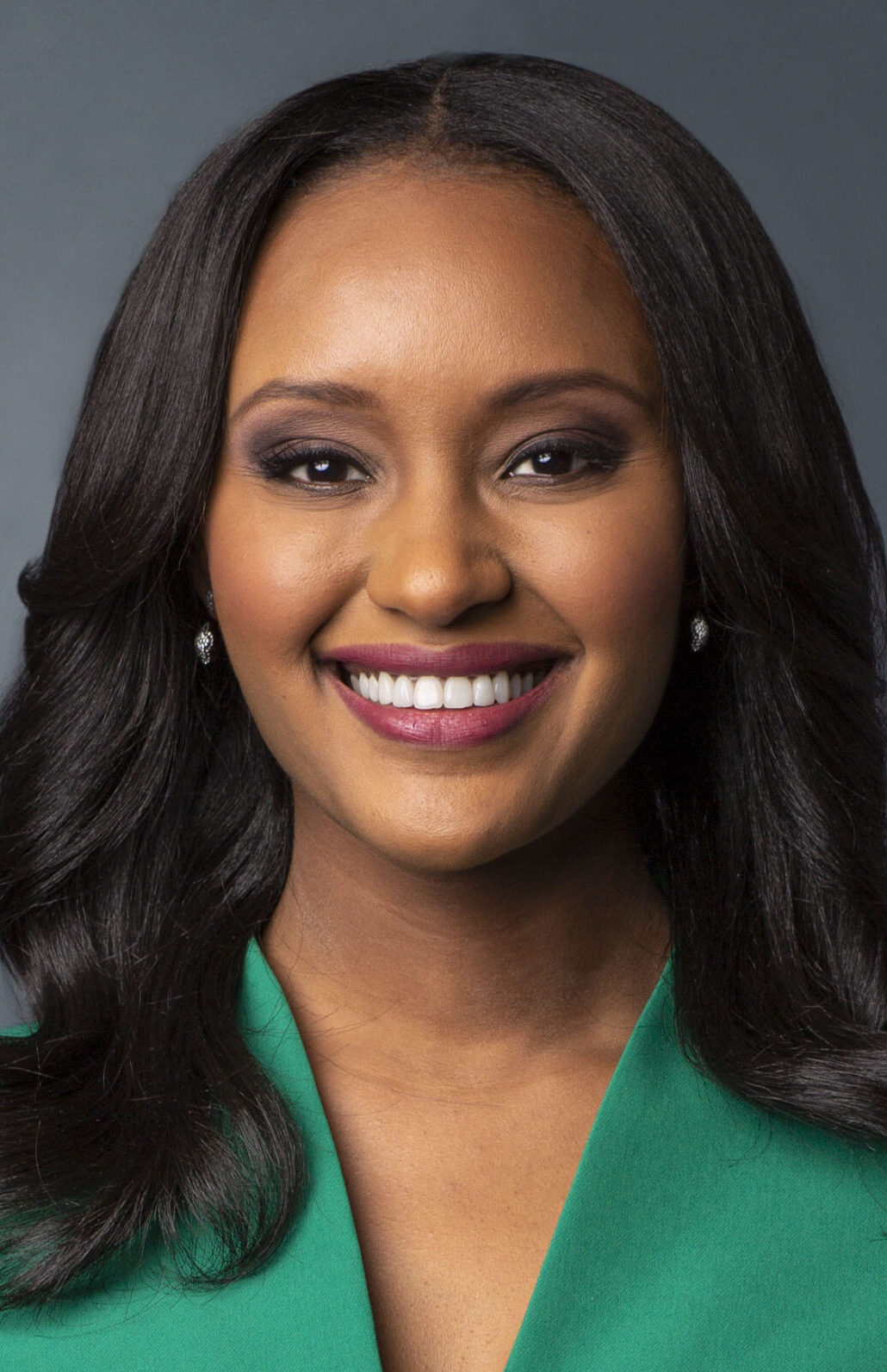 As the Philadelphia Business Journal reported in January, “The allegations levied by former CBS3 President and General Manager Brien Kennedy and former News Director Margaret Cronan include that Dunn referred to Washington, who is Black, as ‘just a jive guy,’ asked if the station’s choice for morning anchor was ‘too gay for Philadelphia’ and stated that he ‘hated’ the face of former anchor Rahel Solomon (pictured), a Black journalist now working at CNBC.”
As the Philadelphia Business Journal reported in January, “The allegations levied by former CBS3 President and General Manager Brien Kennedy and former News Director Margaret Cronan include that Dunn referred to Washington, who is Black, as ‘just a jive guy,’ asked if the station’s choice for morning anchor was ‘too gay for Philadelphia’ and stated that he ‘hated’ the face of former anchor Rahel Solomon (pictured), a Black journalist now working at CNBC.”
“I want to be very clear that the external investigation under the direction of Keisha-Ann Gray at Proskauer Rose is not over and will continue,” Cheeks said, James reported.
- National Association of Black Journalists: Departure of CBS Execs Dunn and Friend Must Only Be the Beginning of Eliminating Toxic Culture (April 8)
Black Journalist Promoted to No. 2 at Teen Vogue
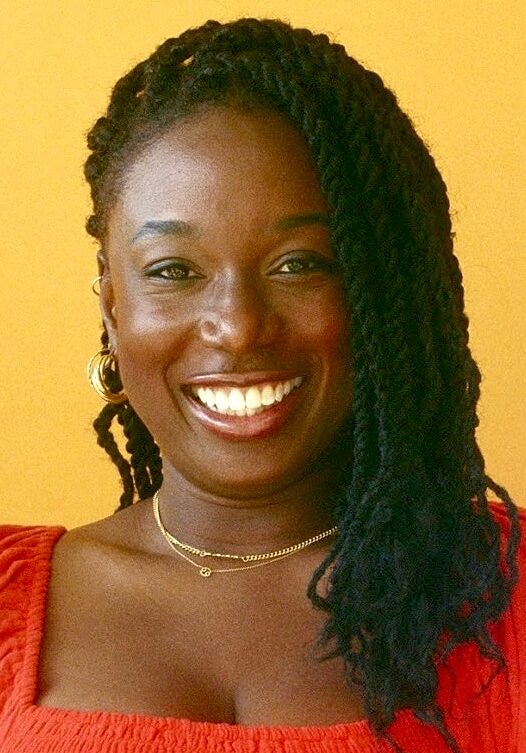 The publishers of Teen Vogue, who made diversity a priority when they hired Alexi McCammond as their ill-fated choice for editor-in-chief, have promoted Danielle Kwateng (pictured), a Black journalist, to executive editor. Kwateng is currently entertainment and culture director.
The publishers of Teen Vogue, who made diversity a priority when they hired Alexi McCammond as their ill-fated choice for editor-in-chief, have promoted Danielle Kwateng (pictured), a Black journalist, to executive editor. Kwateng is currently entertainment and culture director.
Samhita Mukhopadhyay, Teen Vogue’s previous executive editor, was considered the No. 2 person when she announced March 19 that she was resigning.
“Her departure, however, didn’t appear to be tied directly to the turmoil surrounding McCammond, and was reportedly announced internally about six weeks ago,” Keith J. Kelly reported at the time for the New York Post.
No new editor-in-chief has been named. Previous editor Lindsay Peoples Wagner, also a Black journalist, announced her departure in early January, saying she was returning to New York magazine to take over its fashion blog, The Cut.
McCammond, formerly a political reporter for Axios, resigned from Conde Nast just days before she was set to begin the Teen Vogue job.
As Katie Robertson reported March 18 for The New York Times, “Her job status became shaky days after Condé Nast named her to the position, when the offensive tweets she had posted as a teenager in 2011 resurfaced. They included comments on the appearance of Asian features, derogatory stereotypes about Asians and slurs for gay people. Ms. McCammond had apologized for the tweets in 2019 and deleted them. Screenshots of the tweets were recirculated on social media after her hiring at Teen Vogue was announced on March 5.”
In a letter to readers posted Wednesday, Kwateng said, “We at Teen Vogue have read your comments and emails and we have seen the pain and frustration caused by resurfaced social media posts. While our staff continued doing the groundbreaking and progressive work we’re known for, we stopped posting it on social media as we turned inward and had a lot of tough discussions about who we are and what comes next. We’re not perfect, but we do know our place in the media landscape and recognize that our readers make up the DNA of our work.”
Kwateng also wrote, “We are invested in you as much as you are invested in us.
“I’m so excited for the future of Teen Vogue. Our diverse and brilliant staff of editors and writers plan to continue amplifying the voices of the unheard, telling stories that normally go untold, and providing resources for teens looking to make a tangible impact in their communities. But we also plan to evolve with our readers, because we can’t be the young person’s guide to saving the world without you.”
Before Teen Vogue, Kwateng was entertainment editor of Essence, where she was interviewed in 2017 by Development Counsellors International, described as “the leader in travel marketing and economic development marketing, increasing visitors and business inquiries for destinations around the globe.” The topic was how to pitch stories.
“When she’s not diligently keeping us informed with the latest breaking news as it relates to Hollywood, music, film and television, Danielle is busy curating for her digital shop, TheVolta.co, a place for talented artisans of color to sell their goods while highlighting other creatives in the field. Her passion includes championing women and artists of African diaspora,” the story said.
- Andrew Court, DailyMail.com: Ex-Teen Vogue editor Alexi McCammond, 27, is seen for the first time since resigning over racist tweets as she walks with boyfriend T.J. Ducklo — who quit White House after his own scandal. Now they both need a new job (March 20)
- Sarah Ellison, Washington Post: Inside the Teen Vogue mess — which is really a Condé Nast mess
Denver Station Ousts 3 Latinas in One Year
April 3, 2021
First-Person Story Moves NAHJ, Local Officials
Hedge Fund Won’t Admit Racism at Denver Post
Chauvin Trial Can Trigger Trauma for Journalists
GM Pledges to Quadruple Spending in Black Media
High Court Rebuffs Minority-Ownership Advocates
Female Journalists Face Twice the Danger
Reporters Find Dangerously High Lead Levels
For This Journalist, a Talk Show Is About Listening
Forcibly Removed Blacks May Yet Get Attention
Short Takes
Support Journal-isms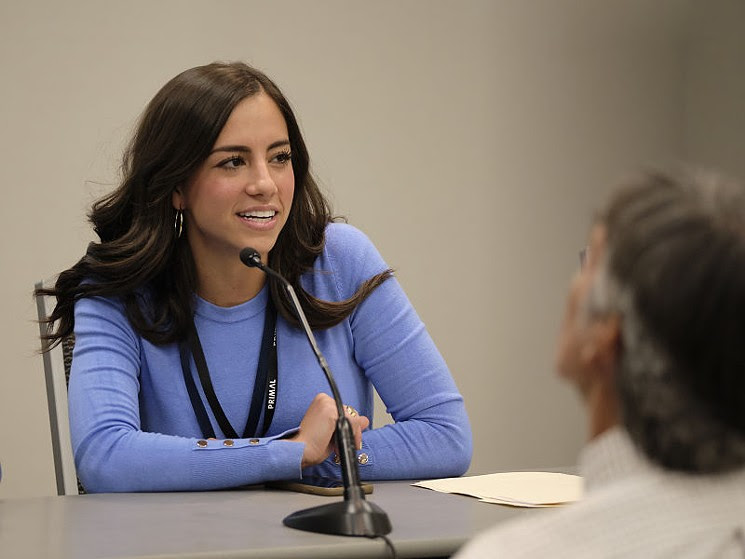
First-Person Story Moves NAHJ, Local Officials
“After two years and hundreds of community stories, my contract was not renewed, and I am no longer a reporter at 9News,” Lori Lizarraga wrote Sunday for Westword, an alternative publication in Denver. “Like several Latinas before me, leaving was not my choice.
“In fact, I am the third on-air Latina reporter at 9News to be let go in less than a year — a first-time experience in this industry for each of us, and unique, too, for the station, which has renewed every other reporter since 2018.”
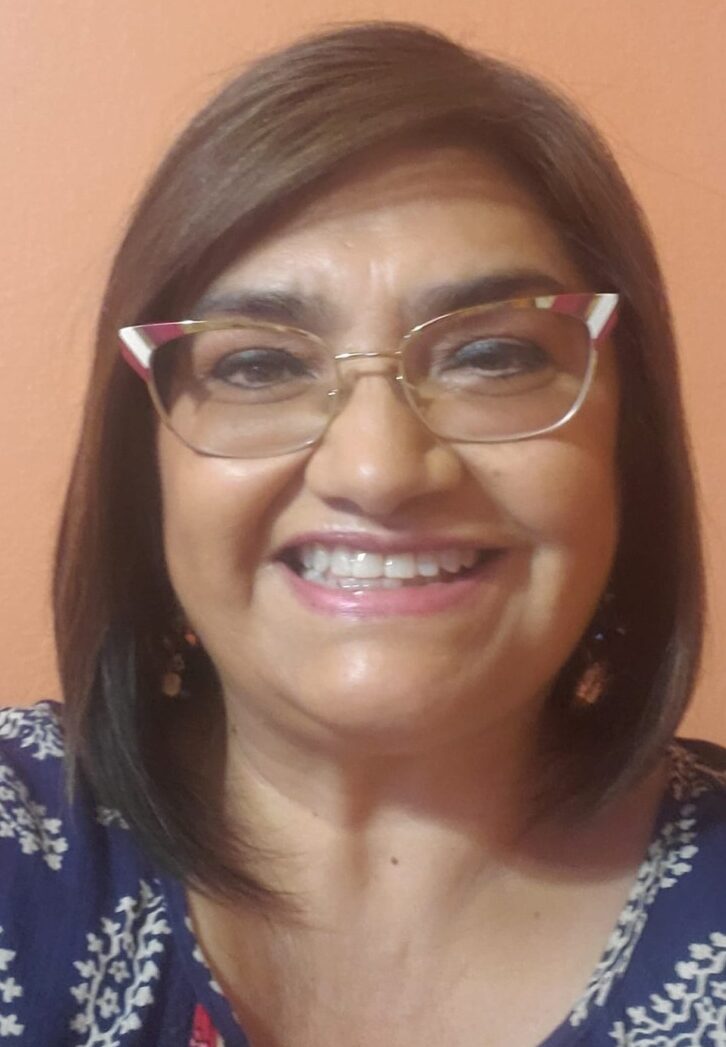 The commentary drew the attention of local Latina elected officials and the National Association of Hispanic Journalists, whose president, Nora López (pictured), issued a statement that NAHJ is “deeply troubled by the treatment that Lizarraga and her colleagues have described.” The association requested a meeting with Tegna, which owns the station, KUSA-TV.
The commentary drew the attention of local Latina elected officials and the National Association of Hispanic Journalists, whose president, Nora López (pictured), issued a statement that NAHJ is “deeply troubled by the treatment that Lizarraga and her colleagues have described.” The association requested a meeting with Tegna, which owns the station, KUSA-TV.
In addition, López said, “NAHJ will be requesting a diversity and inclusion report from TEGNA leadership that outlines how many Latino news leaders and journalists work for the company in Denver and across the country at TEGNA stations.”
 Lizarraga continued, “It’s not just that the three of us were ‘not up to 9News standards.’ It’s that the standard was a moving target that our contributions uniquely did not reach — for Kristen Aguirre (pictured), that was eleven months after she had a stroke.
Lizarraga continued, “It’s not just that the three of us were ‘not up to 9News standards.’ It’s that the standard was a moving target that our contributions uniquely did not reach — for Kristen Aguirre (pictured), that was eleven months after she had a stroke.
“It’s that it happened alongside the hire of three more white on-air professionals at 9News just this year; alongside the addition of yet another white man to an investigative news team with a single person of color; alongside months of employees asking for more equitable representation in our coverage and in our newsroom; and all during a global pandemic and racial justice movement that underscored not only the value, but the fundamental need for our perspectives from March 2020 to March 2021 — the exact time frame during which we were each shown the door.”
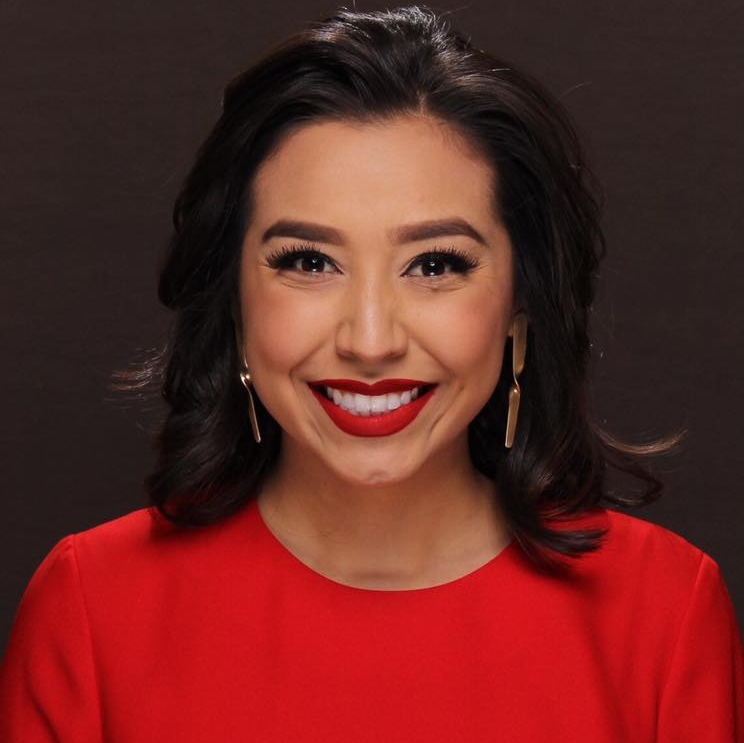 Lizarraga also wrote, “Sonia Gutierrez (pictured) was let go from 9News in 2020. During her time there, she could not cover immigration unless she disclosed her own immigration status on TV first.
Lizarraga also wrote, “Sonia Gutierrez (pictured) was let go from 9News in 2020. During her time there, she could not cover immigration unless she disclosed her own immigration status on TV first.
“ ‘When I asked for an explanation or for examples of my work that showed bias, I did not receive a clear response,’ she told me. ‘For three years, I saw other journalists bring their lived experiences to the table as assets and go on to better cover those stories without having to reveal personal information.’
“She was recently hired as a community journalist for another local network.”
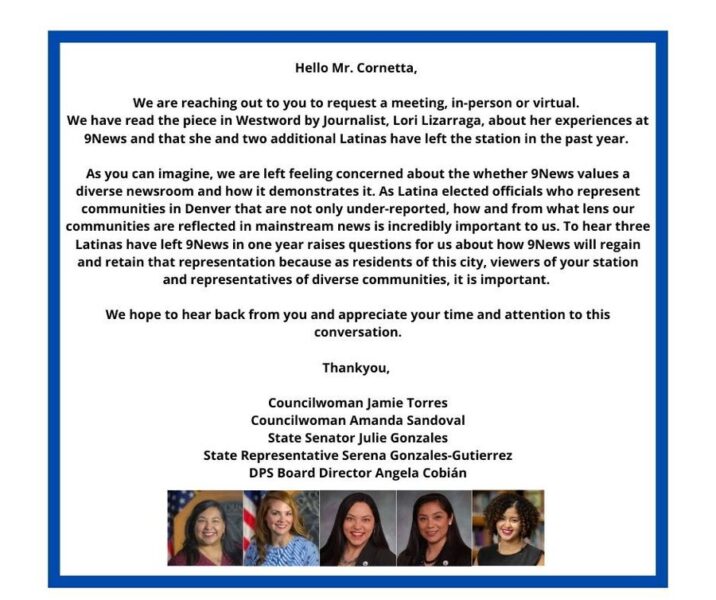
In addition, Lizarraga wrote, “As a first-gen 25-year-old Latina and one of several Latinos at 9News with the same feedback, I was surprised how often our voices and lived experiences in the immigrant community were so readily dismissed. If not the verbiage itself, the lack of productive conversation and consideration of our perspectives in a mainstream media newsroom should be concerning.”
Tegna spokesperson Anne Bentley messaged Journal-isms Friday, “Our Chief Diversity Officer has been in communication with NAHJ” and pointed to this statement from Mark Cornetta, KUSA president and general manager:
“Increasing diversity, equity and inclusion is a continuing commitment in our newsroom and at our station. Like all newsrooms, we are striving to do better. Since the start of 2020, 44 percent of hires on our content team are people of color, with 24 percent of content hires comprised of Hispanic/Latinx employees.
“As we continue our diversity, equity and inclusion focus, our content team and news leadership will take part in an Inclusive Journalism program and training that begins this April. We continue to listen to input from our Diversity & Inclusion committee of employees, as well as very specific diversity and inclusion feedback from our annual employee survey -– all with the goal [of] taking steps to further improve our culture.”
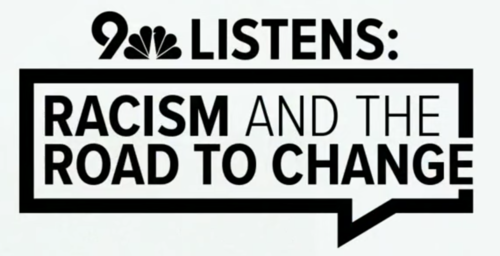
Last June, the station produced a special, “Racism and the Road to Change,” hosted by anchor Kim Christiansen.
Scott Jones of the television news website FTVLive wrote then, “KUSA called their special ‘Road to Change’ but the road they should be working on is the one that leads up to the station’s front door.
“It’s time KUSA put a much stronger focus on hiring black Journalists.”
Denver councilwoman Jamie Torres tweeted Friday that a five-person delegation of public officials met with general manager Cornetta and members of his team and suggested that a person of color replace the director of content.
“We set a follow-up meeting for two weeks from today referencing the 43+ questions we got from community because we believe that the next step after our private initial meeting is a broader public discussion.”
- Ashley Alvarado, medium.com: The unglamorous reality of community engagement and why it’s totally worth it
- Joshua Benton, Nieman Lab: From public to publics: News orgs need ombudsmen to push for more diverse representation, inside and out
- Tauhid Chappell, Generocity: ‘Issues inside newsrooms bring real-world harm and put Black lives in danger’
- Liv Facey, HuffPost UK: I’m A Black Journalist. The Media’s Inability To Tackle Its Racism Has Me Questioning My Future
- Cynthia Adina Kirkwood blog: Go West, Black Woman
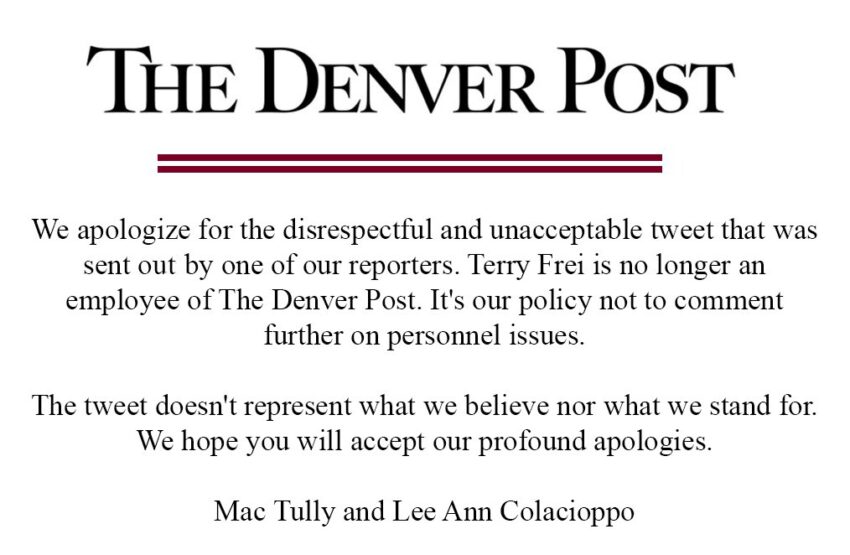
Hedge Fund Won’t Admit Racism at Denver Post
The Los Angeles Times, the Kansas City Star and other newspapers have acknowledged the harm caused by their racism in past years, but the Denver Post won’t be joining them, the Denver Newspaper Guild said Wednesday.
“In the wake of the horrific killing of George Floyd last year, several of the Post’s journalists began meeting in July to examine the newspaper’s role in perpetuating systems of racism and inequality and to seek solutions,” the Denver Post unit of the Guild said to Post readers.
“The group of journalists created a list of action items, solicited the approval and input of the newsroom’s union members, and in September presented the ideas to local management. Several of the newsroom’s managers then joined our group to begin work on the stated goals, including publicly posting a letter committing to change and acknowledging how The Denver Post has previously not represented all of Denver’s communities fairly — or at all.
“For months, we worked with local management to craft a letter, which management then sent to corporate lawyers and human resources personnel. But the board of Alden Global Capital, the hedge fund that owns this newspaper, earlier this month rejected the release of the letter. They did not approve of language admitting the harms The Denver Post — like many other local newspapers — has caused marginalized communities. . . .”
The Guild called Alden Global Capital’s decision “shameful and cowardly. It is impossible to implement change without acknowledging past wrongdoing.”
Nevertheless, the Guild continued, “We’re calling on our company and owners to:
- “Actively ensure recruitment practices reach candidates in underrepresented communities so our candidate pools for jobs and internships include those groups.
- “Make its own commitments to improving diversity, equity and inclusion.
- “Provide professional diversity and anti-racism training for our staff and managers on an ongoing basis.
- “Improve the quality and tenor of The Post’s online comment section by removing it completely or by employing a moderation service so that every comment is read and approved before appearing on the website.
“We want a newsroom committed to telling the stories of people who are excluded or underrepresented in the pages of The Denver Post, and to giving those stories the resources and prominence they deserve,” the Guild said.
Alden Global Capital did not respond to a request for comment.
- Editorial, Orlando Sentinel: Deliver us from Alden so the Orlando Sentinel can continue covering Central Florida
Don Lemon tears up on his “CNN Tonight” show as activist scholar Cornel West relates the significance of the George Floyd killing. (video)
Chauvin Trial Can Trigger Trauma for Journalists
“As the trial of Derek Chauvin becomes a central focus of the news cycle, we urge news companies to provide resources to Black journalists and communicators to help them cope with the emotional trauma of covering, rewatching and hearing the testimonies of George Floyd’s death,” Dorothy Tucker, president of the National Association of Black Journalists, said in a statement on Friday.
“For many reporting on this story, they must work hard to balance the reality that Floyd could have been them or their loved ones while also maintaining their professionalism, as they report the facts. Covering the trial may also trigger trauma tied to past experiences and previous stories of Black citizens harmed at the hands of police. . . .”
Meanwhile, a report in the Star Tribune indicates that so-called “citizen journalists” are subject to trauma as well. “Darnella Frazier’s viral video of George Floyd’s final, struggling moments showed the world what she happened to see and document on a Minneapolis street last May,” Zoë Jackson reported Friday.
“This week, the world got a glimpse of the trauma that still haunts her because of it.
” ‘There have been nights I stayed up apologizing and apologizing to George Floyd for not doing more and not physically interacting and not saving his life,’ Frazier testified tearfully, between sharp inhales in former police officer Derek Chauvin’s murder trial. ‘But it’s like not what I should have done, it’s what he should have done,’ she said referring to Chauvin.
“Like Frazier, who simply happened to be taking her 9-year-old cousin to the store that evening, other people who have stumbled upon and documented instances of police violence describe recording as [the] only thing they could do in situations where they felt helpless. Often, they end up encumbered with guilt, sleepless nights and other mental health concerns. . . .”
- Jon Allsop, Columbia Journalism Review: A traumatic news cycle for journalists and audiences
- Nia-Malika Henderson, CNN: Why I can’t watch the Derek Chauvin trial
- Josh Marcus, Independent, Britain: The Minnesota journalists of colour changing the way policing is covered in America amid the Derek Chauvin trial (registration may be required)
- Noreen Nasir and Corey Williams, Associated Press: Chauvin’s trial leaves many Black viewers emotionally taxed

GM Pledges to Quadruple Spending in Black Media
“General Motors, one of the nation’s biggest advertisers, said Thursday it would quadruple the percentage of its advertising dollars that go to Black-owned media outlets between now and 2025,” Brian Steinberg reported Thursday for Variety.
“GM’s new effort is a sign of the scrutiny and pressure that corporate giants are facing to spread their corporate spending around a wider array of firms.
“GM said it intended to increase the allocation of its ad spending from its current 2% with Black-owned media to 4% by 2022 and to 8% by 2025.
“ ‘Black-owned media are a vital component of our marketing mix, and we evaluate our spend for media partners through several core metrics, including transparency, innovation, ad quality, audience delivery and brand safety,’ General Motors said in a statement Thursday. The company also said it would in May launch an ‘upfront’ process with diverse media owners ‘that encourages partners and potential partners to submit business proposals’ that ‘will be accredited by a third-party to ensure fairness and transparency.’
“GM’s move came after the automaker was targeted by a group of Black media leaders, including entrepreneur Byron Allen. The group in recent days took out ads in the Detroit Free Press and Wall Street Journal to deliver an open letter to GM CEO Mary Barra. The group suggested the manufacturer of Cadillac and Chevrolet spent less than 0.5% of its advertising in Black-owned media outlets. On Thursday, GM said that it has allocated 2% for 2021.
“A number of advertisers and ad groups have in recent days taken steps to show their interest in Black media, which include Allen’s Allen Media Group, Revolt Media, Ozy, Essence Magazine and Urban One. Procter & Gamble, the large consumer-products manufacturer, earlier this week unveiled an initiative to bring more Black creators into the media and entertainment industries and to call for better portrayals of Black individuals and consumers in programming. . . .”
- Google Answers: African Americans & the Cadillac (2003)
High Court Rebuffs Minority-Ownership Advocates
“On Thursday, the U.S. Supreme Court affirmed strictly on procedural and agency-deference grounds the Trump FCC’s 2017 order that loosened local broadcast-ownership limits,” Timothy Karr wrote Thursday for the advocacy group Free Press.
“The Court’s decision allows that 2017 order to stand for now, unfortunately prolonging the agency’s ongoing neglect of its mandate to ensure diversity, competition and localism in broadcast ownership.” The vote was unanimous.
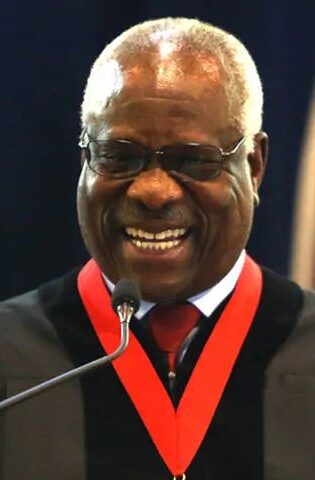 Karr continued, “The ruling in Prometheus Radio Project v. FCC is the culmination of the long-running challenge from Free Press and allies to FCC decisions that have repeatedly tried to dismantle media-ownership limits while failing to study the impact of such rule changes on broadcast-ownership opportunities for women and people of color.”
Karr continued, “The ruling in Prometheus Radio Project v. FCC is the culmination of the long-running challenge from Free Press and allies to FCC decisions that have repeatedly tried to dismantle media-ownership limits while failing to study the impact of such rule changes on broadcast-ownership opportunities for women and people of color.”
David Honig, founder of the Multicultural Media and Telecom Council, which monitors the FCC, messaged that “the decision was on narrow grounds. The 9-0 vote speaks to its non-controversiality, not to six justices’ conservatism. It’s basically a routine Administrative Procedure Act (‘APA’) decision slightly expanding the zone of judicial deference to federal agency findings. Here the agency made findings based on (1) backward-looking research, and (2) the absence of any available forward-looking research. The agency didn’t find any potential adverse future impact on minority/women ownership, and the justices decided that wasn’t an abuse of discretion.
“Since it was possible to resolve this case on a narrow ground, there was no need for the court to reach more controversial theories including those relating to constitutionality.
“This may actually help the current FCC administration, which might enjoy the relative unlikelihood of a successful Administrative Procedure Act challenge to the agency’s discretion if the agency regulates in a manner that it believes will advance minority/women ownership. That could happen.
“To be sure, it would have been much better if the public interest and minority organizations had prevailed. If our side had to lose, this was the best way to do so.”
The opinion was authored by Justice Brett Kavanaugh.
Ashley Cullins added for The Hollywood Reporter, “A concurring opinion from Justice Clarence Thomas (pictured, above) says the FCC had no obligation to consider minority or female ownership in the first place. The fact that it was even part of the conversation with regard to these changes, he argues, was the result of judge-made procedures dating back to 2004. The FCC’s focus is encouraging viewpoint diversity for the benefit of consumers, he argues, not ownership diversity for the benefit of producers.”
Thomas “noted, too, that ‘The F.C.C. has recently questioned the validity of the assumption that ownership diversity promotes viewpoint diversity,’ Adam Liptak wrote for The New York Times.

Female Journalists Face Twice the Danger
Of all the stories commemorating Women’s History Month and International Women’s Day, which both took place in March, this was perhaps the most concerning:
“Women journalists endure ‘twice the danger’ of their male colleagues because of the risk of sexist violence both in the field and in their own newsrooms,” as Charlotte Tobitt reported March 8 for the Press Gazette in Britain.
“Reporters Without Borders (RSF) has produced a report on sexism in journalism, defined as all forms of sexist and sexual violence (including verbal and physical threats) to mark International Women’s Day on 8 March.
“Some 112 journalists – RSF’s own correspondents and journalists who write about gender issues – in 120 countries filled in a survey about the trends they are seeing.
“The group found that all women journalists are concerned and vulnerable – whether they are on a permanent staff contract, fixed-term or freelance – although ‘the more precarious her employment status the less likely she will be able to make her voice heard and defend herself’.
“More than two-thirds (71%) were aware of discrimination towards women journalists because of their gender and 73% said most of this behaviour occurs online, making the internet more dangerous than the streets. . . .”
Tobitt also wrote, “Following the Internet, it is the workplace that the most respondents (58%) identified as the location ‘where sexist violence has been perpetrated.’ This perception has been reinforced by the #MeToo movement’s spread throughout the world and the fact that women journalists are now daring to denounce sexual attacks or sexual harassment in such countries as the United States, Japan and India.”
- Coalition for Women in Journalism: Report: Asian American Women Journalists on the Frontline of Hate and Negligence (March 2021)
- Inday Espina-Varona, Global Voices: For this Filipina journalist, every day is a battle with fear (March 8)
- Gary Harki, Poynter Institute: When writing about race, abuse follows. Especially for journalists of color and women. (March 12)
- Julianne Malveaux, syndicated: Black Women’s Organizations Matter (March 3)
- Donna M. Owens, USA Today: Breonna Taylor and hundreds of Black women have died at the hands of police. The movement to say their names is growing. (March 11, updated March 15)
- Christy Somos, CTVNews.ca: March marked grim milestone in violence toward female journalists: global coalition
- Hanaa’ Tameez, Nieman Lab: Less than a third of the world’s top editors at major outlets are women (March 8)
- Ian Thomsen, Northeastern University: Women journalists are fighting to overcome the ‘macho dynamics’ of US newsrooms (March 24)
- Sakshi Venkatraman, NBC News: Shamed for body hair growing up, Desi women now challenging racist standards (March 4)
Reporters Find Dangerously High Lead Levels
“Mayor Jane Castor called this week’s Tampa Bay Times investigation into unsafe work conditions at Gopher Resource concerning and has directed city staff to gather information from regulatory agencies that monitor the factory,” Charlie Frago reported March 26, updated March 27, for the Times.
“In a statement late Thursday, the mayor said she supported U.S. Rep. Kathy Castor, a Tampa Democrat, in her efforts to update the federal Occupational Safety and Health Act of 1970.
“Kathy Castor wrote a letter to federal Environmental Protection Agency Director Michael Regan on Friday asking for the agency to review the factory’s operations, saying the ‘disturbing’ findings in the Times report indicated that the company put corporate profits above worker and community members’ safety. . . . “
Among the findings, “Gopher exposed workers for years to levels of lead in the air that were hundreds of times higher than the federal limit. At times, the concentration was considered life-threatening. Workers described regular tasks that left them caked with dust, as though they’d been dunked in powdered sugar.”
 The investigation, by Corey G. Johnson (pictured), Rebecca Woolington and Eli Murray, was part of a collaboration with “Frontline,” the PBS series, through its Local Journalism Initiative. It was published March 24.
The investigation, by Corey G. Johnson (pictured), Rebecca Woolington and Eli Murray, was part of a collaboration with “Frontline,” the PBS series, through its Local Journalism Initiative. It was published March 24.
“Tampa Bay Times reporters spent 18 months examining thousands of pages of regulatory reports and company documents, including data tracking the amount of lead in the air and in workers’ blood. They interviewed more than 80 current and former workers, 20 of whom shared their medical records,” the report said. It was published under the headline, “Hundreds of workers at a Tampa lead smelter have been exposed to dangerous levels of the neurotoxin. The consequences have been profound.”
- Rowan Philp, Global Investigative Journalism Network: 12 Tips on Reaching More People and Getting Bigger Impact on Investigative Stories
For This Journalist, a Talk Show Is About Listening
Kojo Nnamdi (pictured) hosted the final episode of “The Kojo Nnamdi Show” Thursday on Washington’s public radio station WAMU-FM, although he will continue to host a Friday show on politics.
 On the broadcast, Nnamdi, a former reporter for the Howard University commercial radio and television stations, was asked, as “someone who’s been on radio for decades, you know, what makes this special for you? What has kept you going, all this time?”
On the broadcast, Nnamdi, a former reporter for the Howard University commercial radio and television stations, was asked, as “someone who’s been on radio for decades, you know, what makes this special for you? What has kept you going, all this time?”
Nnamdi replied, “I like radio because of two things, in particular. One, as a host on radio, I actually do more listening than I do talking. And I think that listening is a skill. We are now so, all of us, involved in communicating on such a variety of media and in such a variety of ways, that it is my view that we don’t spend enough time listening. And the one thing you have to do in radio, whether you are a host or literally a listener, is listen. So, that’s what I enjoy.
“The second thing I enjoy about radio is its intimacy. Most people listen to radio when they are by themselves. And so, the radio host is only really communicating with one listener at a time, even though a former colleague of mine used to talk about his vast listening audience. You’re really talking to one person at a time and as a result you develop a relationship with that individual that can be intensely personal. And I think that — you don’t really get that from any other medium but radio. Now, I think you might be able to get it from podcasts, because people also tend to listen to podcasts by themselves. But for me, that’s what radio’s all about.”
Christiane Amanpour, reporting for “60 Minutes” in 2003, quotes the evicted residents of Diego Garcia saying “they left paradise and landed in hell.” (Credit: YouTube)
Forcibly Removed Blacks May Yet Get Attention
Few have heard of “a little-known group of 55 islands in the middle of the Indian Ocean known as the Chagos Archipelago.” It’s where the United States and the United Kingdom evicted the Black people who had lived there for 200 years — separating families and poisoning pets as a harbinger of what might be in store for them — so that the U.S could build a strategically positioned military base.
Part of the reason so few have heard of the archipelago and its base, Diego Garcia, is because no journalists, or anyone besides military people and their workers, are allowed there.
Now, according to an op-ed piece Thursday in The New York Times, there is a proposal for a way for the evicted people to return to their homeland after all these years, if the Biden administration and the British act on it.
The op-ed author is Philippe Sands, a law professor at University College London.
Sands explains, “For 150 years they were part of the British colony of Mauritius. Then, in 1965, at the instigation of President Lyndon Johnson, Britain decided to separate the islands from Mauritius and, at just the time that the world was agreeing the era of colonialism was over, created a new colony, called the British Indian Ocean Territory. One of the islands, Diego Garcia, was leased to the United States for a military base.
“Stealing a Nation,” a 2004 Granada Television documentary written and directed by John Pilger, reports on the expulsion of Chagossians from the Chagos Archipelago, chiefly from Diego Garcia island, forcibly removed by the British government between 1967 and 1973 to Mauritius, 1,000 miles away, so that the island could be used as an American and British airbase.
“The episode, which the British government itself has since called ‘shameful,’ had not been widely known — until now, as these events come back to haunt Britain and, indirectly, America.
“Mauritius has long sought to get Chagos back, and its effort has been supported by numerous states — including India, the entire African continent, various governments in Latin America and Europe — and the many displaced Chagossians who never gave up on their hope to return to their homes. . . .
“But the British have refused to leave. . . .
“There is, however, a simple and effective solution — if indeed the U.S. government is truly committed to the rule of law and international treaties.
“Mauritius already has offered the United States a 99-year lease over Diego Garcia, providing a long-term security that is lacking under America’s current arrangement with Britain, which expires in 2036. In return, the Chagossians would be allowed to come back to parts of Chagos. A marine protection area could be established to conserve a pristine maritime environment. The flag would finally be lowered on Britain’s last colony in Africa.
“It’s a win-win-win proposition. Security, human rights and the marine environment are protected. The rule of law, treaties and UNCLOS are promoted. Charges of hypocrisy and double standard are cast to the wind. . . .”
- Jenni Marsh, CNN: Is the United States about to lose control of its secretive Diego Garcia military base? (March 10, 2019)
- The Patriot, Zimbabwe: The Chagossians of Diego Garcia: The untold atrocities (Feb. 5, 2015)
- Princeton University Press: Island of Shame: The Secret History of the U.S. Military Base on Diego Garcia by David Vine (2011)
- Philippe Sands, The Guardian: At last, the Chagossians have a real chance of going back home (May 24, 2019)
Short Takes
 Editor & Publisher’s annual list of “25 Under 35: The Next Generation of News Professionals“, released Wednesday, was scant on diversity. Nu Yang, (pictured) editor-in-chief, responded to Journal-isms, “I definitely understand the concerns about the lack of diversity and know we can do better. Our selection process is based on the nominations we receive (this year, we received close to 60 submissions from the US and Canada). We put out a call for nominations in January and we select the winners based on the strength of the submission and the individual’s skills and talents. I’m open to hearing suggestions on how we can better promote the competition to reach more diverse people, and we also encourage more people to submit a nomination next year.”
Editor & Publisher’s annual list of “25 Under 35: The Next Generation of News Professionals“, released Wednesday, was scant on diversity. Nu Yang, (pictured) editor-in-chief, responded to Journal-isms, “I definitely understand the concerns about the lack of diversity and know we can do better. Our selection process is based on the nominations we receive (this year, we received close to 60 submissions from the US and Canada). We put out a call for nominations in January and we select the winners based on the strength of the submission and the individual’s skills and talents. I’m open to hearing suggestions on how we can better promote the competition to reach more diverse people, and we also encourage more people to submit a nomination next year.”
 The placement of the Nation of Islam on the Southern Poverty Law Center’s list of hate groups returned to the news Friday with mention of that designation in some reports on that day’s vehicular attack on the U.S. Capitol. The suspect is Noah Green (pictured), a troubled Nation of Islam member who was slain by police after his car rammed into two police officers, killing one. The center had already scheduled a webinar for Wednesday at 1 p.m. Eastern time to “provide a detailed overview of the recently released 2020 Year in Hate report, including key takeaways about how hate and extremism in the U.S. continued to evolve in the final year of the Trump administration.”
The placement of the Nation of Islam on the Southern Poverty Law Center’s list of hate groups returned to the news Friday with mention of that designation in some reports on that day’s vehicular attack on the U.S. Capitol. The suspect is Noah Green (pictured), a troubled Nation of Islam member who was slain by police after his car rammed into two police officers, killing one. The center had already scheduled a webinar for Wednesday at 1 p.m. Eastern time to “provide a detailed overview of the recently released 2020 Year in Hate report, including key takeaways about how hate and extremism in the U.S. continued to evolve in the final year of the Trump administration.”
- “Today marks the start of a new chapter for the Pacific Daily News, Guam’s longest-serving daily newspaper, which is returning to local ownership after nearly five decades as part of the Gannett national media company,” Steve Limtiaco reported Friday for the Pacific Daily News.
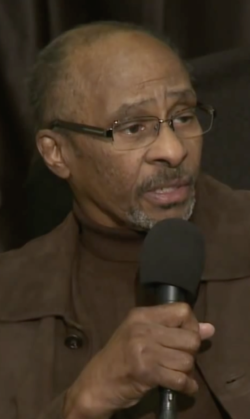 The name of Acel Moore (pictured), the late Philadelphia Inquirer columnist and a co-founder of both the Philadelphia Association of Black Journalists and the National Association of Black Journalists, is one of four in the running to replace that of Andrew Jackson on a South Philadelphia K-8 school, Michaela Winberg reported Monday for Billy Penn. “During his 1830s tenure as the seventh U.S. president, Jackson pushed forward the ‘Trail of Tears,’ a massive government effort to remove Indigenous people from their native lands. He also personally enslaved more than a hundred African Americans. . . . The next step in the process is another virtual town hall on April 15. After that, the school will send out a survey to collect votes.”
The name of Acel Moore (pictured), the late Philadelphia Inquirer columnist and a co-founder of both the Philadelphia Association of Black Journalists and the National Association of Black Journalists, is one of four in the running to replace that of Andrew Jackson on a South Philadelphia K-8 school, Michaela Winberg reported Monday for Billy Penn. “During his 1830s tenure as the seventh U.S. president, Jackson pushed forward the ‘Trail of Tears,’ a massive government effort to remove Indigenous people from their native lands. He also personally enslaved more than a hundred African Americans. . . . The next step in the process is another virtual town hall on April 15. After that, the school will send out a survey to collect votes.”
- “Smithsonian Channel and CBS News partnered to present a new, hour-long special exploring the ongoing rise in discrimination against Asian Americans,” the channel announces. “ASIAN AMERICANS BATTLING BIAS: CONTINUING CRISIS features updated reporting and two roundtable discussions with Asian American newsmakers and thought leaders on the pandemic’s effects on Asian American and Pacific Islander communities. The special will premiere this Sunday, April 4 at 10pm ET/PT on Smithsonian Channel.” Trailer
 In Detroit, “Fox 2 newscaster Maurielle Lue (pictured) revealed . . . that she is battling COVID-19 — at the same time she was thanking well-wishers for their cheery birthday greetings,” Neal Rubin reported March 28, updated March 29, for the Detroit News.
In Detroit, “Fox 2 newscaster Maurielle Lue (pictured) revealed . . . that she is battling COVID-19 — at the same time she was thanking well-wishers for their cheery birthday greetings,” Neal Rubin reported March 28, updated March 29, for the Detroit News.
- “Academy Award-winning filmmaker Roger Ross Williams will produce and oversee a documentary series based on materials drawn from The New York Times Magazine and Nikole Hannah Jones’ acclaimed ‘The 1619 Project,‘ slated to debut in the U.S. on the premium streaming service Hulu,” the New York Times Co. announced Thursday. “Oprah Winfrey, Lionsgate and The New York Times announced the wide-ranging partnership to develop ‘The 1619 Project’ into an expansive portfolio of feature films, television series and other content for a global audience in July 2020. . . .” Hollywood Reporter
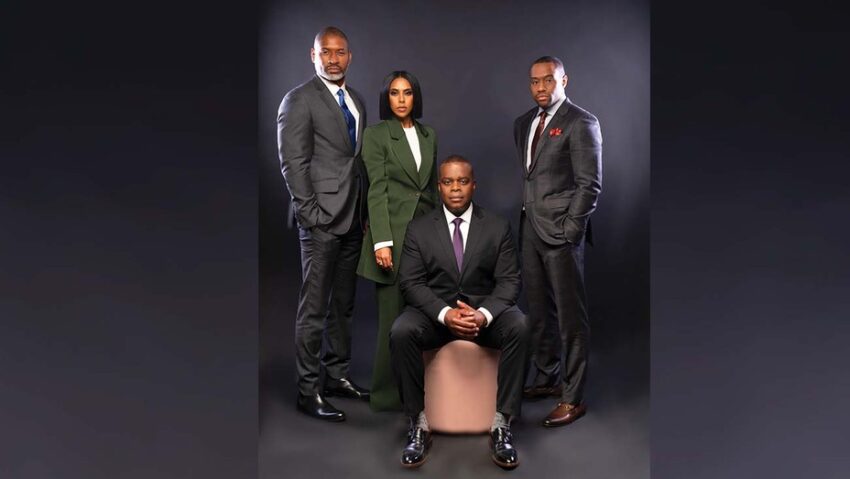
- Marc Lamont Hill’s “Black News Tonight” will kick off Black News Channel’s biggest move yet: rolling out a new primetime lineup, Alex Weprin reported Wednesday for the Hollywood Reporter. “Hill will anchor at 8 p.m. starting April 5; Yodit Tewolde will anchor Making the Case With Yodit at 9 p.m., launching April 12; and New York Times columnist Charles M. Blow will close out the evening with Prime with Charles M. Blow at 10 p.m., beginning April 19. (Notably, BNC’s primetime relaunch arrives as broadcasters focus on the trial of police officer Derek Chauvin in Minneapolis for last year’s killing of George Floyd; it began March 29.)”
- “Nearly 140 documentary filmmakers have signed onto a letter given to PBS executives, suggesting the service may provide an unfair level of support to white creators, facing a ‘systemic failure to fulfill (its) mandate for a diversity of voices.’ “ Eric Deggans reported Wednesday for NPR. “Titled ‘A Letter to PBS From Viewers Like Us,’ the missive references Ken Burns, arguably one of PBS’ biggest non-fiction stars and creator of popular projects like Baseball, Jazz, The Civil War and an upcoming six-hour program called Hemingway.”
 While Nika Soon-Shiong (pictured) has no official title or duties at the Los Angeles Times, the paper itself reported that Nika, daughter of billionaire media mogul and Times owner Patrick Soon-Siong, has become increasingly involved in high-level management decisions, acting as another representative for the family in decisions about the paper and its direction, Maxwell Tani reported Thursday for the Daily Beast. “The Daily Beast spoke with LA Times staffers across multiple levels of the company, many of whom said that Nika’s increased involvement has been a welcome addition to the newsroom.”
While Nika Soon-Shiong (pictured) has no official title or duties at the Los Angeles Times, the paper itself reported that Nika, daughter of billionaire media mogul and Times owner Patrick Soon-Siong, has become increasingly involved in high-level management decisions, acting as another representative for the family in decisions about the paper and its direction, Maxwell Tani reported Thursday for the Daily Beast. “The Daily Beast spoke with LA Times staffers across multiple levels of the company, many of whom said that Nika’s increased involvement has been a welcome addition to the newsroom.”
- “ProPublica announced on Wednesday that it has hired eight reporters to join two of its new regional reporting units,” the nonprofit investigative journalism organization said. “Max Blau, Nicole Carr, Doug Bock Clark, Aliyya Swaby and Seth Freed Wessler will join the team covering the South, and Eli Hager, Mary Hudetz and Nicole Santa Cruz will join the Southwest team. Three additional reporters — one in the South and two in the Southwest — will be announced soon. . . .”
- In Buffalo, N.Y., the “owner of 97 Rock said late Wednesday that it had fired ‘Morning Bull’ host Rob Lederman following an on-air exchange in which he compared toaster settings to the tone of Black women’s skin,” the Buffalo News reported March 24, updated March 30. The National Association of Black Journalists condemned Lederman’s behavior Monday and the Buffalo Association of Black Journalists met with station leaders, Spectrum News reported Wednesday. “The association says 97 Rock quickly started diversity training and has issued an apology that has aired several times since last week. . . . Some of the station’s next steps include more interaction with Buffalo’s communities of color, increasing diversity at the station, and listening sessions with the community.”
- Last month, Connecticut became one of a growing number of states to make race-based hair discrimination illegal. On the “PBS NewsHour” Friday, Yamiche Alcindor reported on how Black Americans often face discrimination because of the way they wear their hair, especially in school and at work.
- Vox’s former editor-in-chief, Lauren Williams, and Akoto Ofori-Atta, who worked together at The Root, “plan to launch Capital B as a national news organization with local bureaus this fall,” Sarah Scire wrote Wednesday for Nieman Lab. “They’re still deciding on the exact number of local bureaus they’ll launch with — and are keeping the specific cities under consideration to themselves for now. But the mission is crystal clear: a Black-led newsroom creating journalism that centers Black Americans.”
- John Yearwood, Politico’s deputy editor on the Trade & Agriculture team and former world editor at the Miami Herald, has been named global news editor on Politico’s World/National Security team, Blake Hounshell, the publication’s managing editor of Washington and politics, announced Thursday. Chris Roush of Taking Biz News has published the memo. Yearwood is also a board member of the International Press Institute.
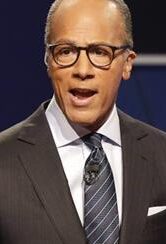 “NBC Nightly News” anchor Lester Holt (pictured), accepting the Edward R. Murrow Award for Lifetime Achievement in Journalism Tuesday (video), argued that “The idea that we should always give two sides equal weight and merit does not reflect the world we find ourselves in. That the sun sets in the west is a fact. Any contrary view does not deserve our time or attention.” Holt was denounced Thursday by Fox News’ Tucker Carlson, who said, “I think Lester Holt seems like a perfectly nice guy, but you don’t turn to Lester Holt for deepthink. The truth is, he’s saying that we know what we know, and we shouldn’t question it, when in fact the reality of life suggests that’s completely wrong.”
“NBC Nightly News” anchor Lester Holt (pictured), accepting the Edward R. Murrow Award for Lifetime Achievement in Journalism Tuesday (video), argued that “The idea that we should always give two sides equal weight and merit does not reflect the world we find ourselves in. That the sun sets in the west is a fact. Any contrary view does not deserve our time or attention.” Holt was denounced Thursday by Fox News’ Tucker Carlson, who said, “I think Lester Holt seems like a perfectly nice guy, but you don’t turn to Lester Holt for deepthink. The truth is, he’s saying that we know what we know, and we shouldn’t question it, when in fact the reality of life suggests that’s completely wrong.”
- Rodney Hunt, photographer and editor for CBS-owned station KCBS-KCAL, has died due to complications from Covid-19, KCBS reported Tuesday. No age was given. Hunt worked in news and sports at the Los Angeles station for 22 years and had been on leave since December. “Hunt was a fixture in the boxing and mixed martial arts world and helped promote local fighters. He appeared on Celebrity Family Feud a few years ago with some of his friends from the boxing community,” Kevin Eck reported for AdAge.com.
- “ABC’s Owned TV Stations division has launched a new race and culture content team that will oversee an expansion in the group’s coverage of underrepresented communities,” Michael Schneider reported March 26 for Variety. “The new initiative launched with the docuseries ‘Our America: Living While Black,’ and has since staffed up to expand its output with several more specials in the works. Under the oversight of ABC Owned TV Stations’ Maxine Crooks, vice president of talent development, and Jennifer Mitchell, senior VP of content development, the race and culture content team has recruited a group of executive producers, as well as journalists at all eight of ABC’s stations, to both handle the new specials but also assist in making sure that the local outlets’ live news programming properly reflects the diversity of their audiences.”
 LaSharah S. Bunting (pictured), director of journalism at the Miami-based John S. and James L. Knight Foundation and a former editor at The New York Times, is joining Simon & Schuster’s adult trade publishing imprint as vice president and executive editor, starting May 3, the publishing company announced March 25. She will acquire nonfiction and fiction. Bunting worked with Dana Canedy, Simon & Schuster senior vice president and publisher, when both were at the Times. “I’ll be based in Miami, but working from Miami and New York City,” Bunting told Journal-isms.
LaSharah S. Bunting (pictured), director of journalism at the Miami-based John S. and James L. Knight Foundation and a former editor at The New York Times, is joining Simon & Schuster’s adult trade publishing imprint as vice president and executive editor, starting May 3, the publishing company announced March 25. She will acquire nonfiction and fiction. Bunting worked with Dana Canedy, Simon & Schuster senior vice president and publisher, when both were at the Times. “I’ll be based in Miami, but working from Miami and New York City,” Bunting told Journal-isms.
- “The NAACP sent a blistering letter to NFL Commissioner Roger Goodell,” Mike Freeman reported March 18 for USA Today, asking the league not to allow Fox to use it as a bargaining tool during upcoming rights fees negotiations, and thus help fund Fox News, which the NAACP called ‘a uniquely destructive force’ that ‘foments racism, undermines public health recovery from the pandemic, and repeatedly attacks the legitimacy of last year’s Presidential election.’ ” Freeman also wrote that the NFL subsequently “announced a mega-deal . . . with television partners CBS, Fox, NBC, and ESPN/ABC, also, the league shifted its Thursday night package to Amazon Prime.”
 “Hemal Jhaveri (pictured), the race and inclusion editor for one of USA Today’s sports sites, says she was fired over a tweet she wrote in the wake of the Boulder massacre” March 22, which left 10 people dead, including a police officer, Jennifer Adams reported March 26 for the Daily Beast. “Before the shooter’s identity and Syrian-American heritage were known, Jhaveri tweeted, ‘it’s always an angry white man. always.’ She later deleted the tweet and apologized -— but YouTuber Dave Rubin and other alt-right personalities had already led a Twitter pile on. ‘It was a careless error of [judgment], sent at a heated time, that doesn’t represent my commitment to racial equality. I regret sending it,’ Jhaveri wrote in a Medium post.”
“Hemal Jhaveri (pictured), the race and inclusion editor for one of USA Today’s sports sites, says she was fired over a tweet she wrote in the wake of the Boulder massacre” March 22, which left 10 people dead, including a police officer, Jennifer Adams reported March 26 for the Daily Beast. “Before the shooter’s identity and Syrian-American heritage were known, Jhaveri tweeted, ‘it’s always an angry white man. always.’ She later deleted the tweet and apologized -— but YouTuber Dave Rubin and other alt-right personalities had already led a Twitter pile on. ‘It was a careless error of [judgment], sent at a heated time, that doesn’t represent my commitment to racial equality. I regret sending it,’ Jhaveri wrote in a Medium post.”
- “The National Association of Black Journalists is partnering with Apple News on an editorial fellowship to give young journalists the opportunity to work at the forefront of news and technology,” Lisa Boylan reported March 26 for Associations Now. “The program will introduce early-career Black journalists to several key editorial areas, followed by a more focused mentorship with Apple News staff members, culminating in an end-of-year presentation to the entire Apple News editorial team.”
- “Following controversial comments on racism in medicine made by a deputy editor at JAMA, the editor in chief of the prominent medical journal was placed on administrative leave,” Apoorva Mandavilli reported March 25 in The New York Times. She also wrote, “The controversy began when Dr. Ed Livingston, a deputy editor, said on a Feb. 24 podcast that structural racism no longer existed in the United States. . . .”
- Univision executives reported “a major expansion into streaming video, announcing the official launch of its ad-free streaming service PrendeTV for sometime next week,” Veronica Villafañe reported March 24 for her Media Moves site. Donna Speciale, president of advertising sales and marketing, also announced that morning show ‘Despierta América’ will expand to Sundays in the fourth quarter. “ ‘This is our Today show or GMA, but the U.S. Hispanic community doesn’t watch those shows,’ stressed Speciale. ‘There are more Hispanics watching DA than GMA and Today combined.’ ”
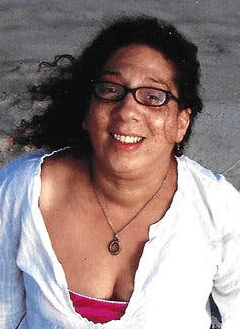 “Gail Slatter (pictured) never received a byline or a photo credit in The New York Times,” Sam Roberts wrote March 25 for the Times. “During the 40 years she worked there, her name appeared in the newspaper only once, in 1997, when she helped flesh out a profile of a 15-year-old murder suspect who happened to have been on her daughter’s swim team at a Y.M.C.A. on Manhattan’s West Side. Ms. Slatter was a news assistant at The Times. But her unassuming job title belied the significant impact she had on what appeared in the paper and on the daily lives of her colleagues, particularly on the culture and photo desks. She was a guide, gatekeeper and guardian.” Roberts also wrote, “Ms. Slatter died at 68 on March 21 in a Bronx hospital. The cause was Covid-19, her daughter, Lauren, said.”
“Gail Slatter (pictured) never received a byline or a photo credit in The New York Times,” Sam Roberts wrote March 25 for the Times. “During the 40 years she worked there, her name appeared in the newspaper only once, in 1997, when she helped flesh out a profile of a 15-year-old murder suspect who happened to have been on her daughter’s swim team at a Y.M.C.A. on Manhattan’s West Side. Ms. Slatter was a news assistant at The Times. But her unassuming job title belied the significant impact she had on what appeared in the paper and on the daily lives of her colleagues, particularly on the culture and photo desks. She was a guide, gatekeeper and guardian.” Roberts also wrote, “Ms. Slatter died at 68 on March 21 in a Bronx hospital. The cause was Covid-19, her daughter, Lauren, said.”
- “Press Gazette’s findings that almost four in ten UK journalists who responded to our survey have experienced or witnessed racism at work are ‘hugely disappointing, but sadly not surprising‘ according to one industry body,” Charlotte Tobitt wrote Thursday for the publication that reports on the British media. “Some 66% of journalist respondents said the UK media is bigoted or racist in some way and 79% of those said it was a problem across all media, not just tabloids. Some 50% of journalist respondents said at least some coverage of Harry’s wife Meghan Markle had been racist in tone or presentation, and 38% said they had personally experienced or witnessed racism whilst working in the UK media.”
- “A Brazilian court has ordered President Jair Bolsonaro to pay compensation to a journalist after he made degrading comments about her,” the BBC reported Sunday. “Mr Bolsonaro had suggested last year that Patrícia Campos Mello had offered sex to a source for negative information about him. The judge said Mr Bolsonaro’s remarks had damaged the journalist’s honour. The president was told to pay her 20,000 reais (£2,500; $3,500) in damages. He can appeal the ruling.”
To subscribe at no cost, please send an email to journal-isms+subscribe@groups.io and say who you are.
Facebook users: “Like” “Richard Prince’s Journal-isms” on Facebook.
Follow Richard Prince on Twitter @princeeditor
Richard Prince’s Journal-isms originates from Washington. It began in print before most of us knew what the internet was, and it would like to be referred to as a “column.” Any views expressed in the column are those of the person or organization quoted and not those of any other entity. Send tips, comments and concerns to Richard Prince at journal-isms+owner@
View previous columns (after Feb. 13, 2016).
View previous columns (before Feb. 13, 2016)
- Diversity’s Greatest Hits, 2018 (Jan. 4, 2019)
- Book Notes: Is Taking a Knee Really All That? (Dec. 20, 2018)
- Book Notes: Challenging ’45’ and Proudly Telling the Story (Dec. 18, 2018)
- Book Notes: Get Down With the Legends! (Dec. 11, 2018)
- Journalist Richard Prince w/Joe Madison (Sirius XM, April 18, 2018) (podcast)
- Richard Prince (journalist) (Wikipedia entry)
- February 2018 Podcast: Richard “Dick” Prince on the need for newsroom diversity (Gabriel Greschler, Student Press Law Center, Feb. 26, 2018)
- Diversity’s Greatest Hits, 2017 — Where Will They Take Us in the Year Ahead?
- Book Notes: Best Sellers, Uncovered Treasures, Overlooked History (Dec. 19, 2017)
- An advocate for diversity in the media is still pressing for representation, (Courtland Milloy, Washington Post, Nov. 28, 2017)
- Morgan Global Journalism Review: Journal-isms Journeys On (Aug. 31, 2017)
- Diversity’s Greatest Hits, 2016
- Book Notes: 16 Writers Dish About ‘Chelle,’ the First Lady
- Book Notes: From Coretta to Barack, and in Search of the Godfather
- Journal-isms’ Richard Prince Wants Your Ideas (FishbowlDC, Feb. 26, 2016)
- “JOURNAL-ISMS” IS LATEST TO BEAR BRUNT OF INDUSTRY’S ECONOMIC WOES (Feb. 19, 2016)
- Richard Prince with Charlayne Hunter-Gault,“PBS NewsHour,” “What stagnant diversity means for America’s newsrooms” (Dec. 15, 2015)
- Book Notes: Journalists Follow Their Passions
- Book Notes: Journalists Who Rocked Their World
- Book Notes: Hands Up! Read This!
- Book Notes: New Cosby Bio Looks Like a Best-Seller
- Journo-diversity advocate turns attention to Ezra Klein project (Erik Wemple, Washington Post, March 5, 2014)

